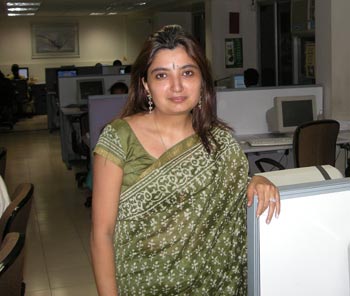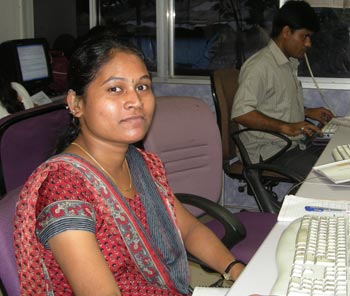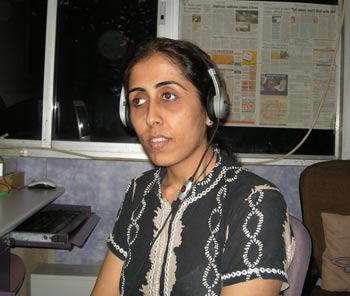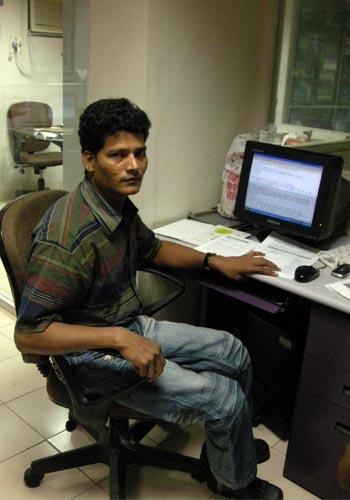
Entrepreneur Shilpi Kapoor has a no-nonsense air about her. Dressed in a crisp sari, she speaks in short, to-the-point sentences and reminds you towards the end of the interview that your time with her is almost up.
Yet in some ways there is something endearing about Kapoor -- her employees seem comfortable around her and speak their mind. They even chuckle at her when she gets uncomfortable posing for the camera ("They know I hate this part," she says). Indeed there is a sense of easy camaraderie in the small office that Kapoor runs from a suburban industrial estate in Mumbai.
Kapoor heads Barrier Break Technologies, an enterprise that tests websites and software to see how 'accessible' or disabled friendly they are. She also believes that it is time disability solutions are not looked at as charity but rather as business propositions. Kapoor (35) should know. She has been making a living at it for herself and supporting her 55-odd employees -- almost 75 per cent of them being disabled -- for quite a few years now.
As a matter of fact, it was her accessibility solutions business that kept her company afloat during the downturn last year.
Here she tells us about her journey on 'the road less travelled':
Much is being made about accessibility these days. You were the first to even introduce the concept in India. What gave you the idea?
I started off as part of an NGO teaching computers to visually impaired people (around 1997). Slowly but surely I realised two things -- one that NGOs almost always have to go around with begging bowls and two they invariably end up spending less on the cause itself.
Meanwhile, I had learnt about the business model on accessibility in the West. By then I had also started Net Systems Informatics (N-Syst) that focussed on knowledge management. We decided to include accessibility solutions primarily because we hoped that Indian companies that signed contracts with their Western counterparts would require their software and sites to be tested for accessibility. Much to my surprise no one was interested.
Around the time (2004) Vision Australia contacted us and asked us if we could test a site and compare notes. It was a great opportunity for us to assess where exactly we stood because in India there was no one we could compare ourselves with.
Turned out that Vision Australia was impressed with our work and that gave us a shot in the arm.
N-Syst was set up to address the needs of Indian companies. But most of our work first came from the West. So we first had to look towards the US to make money.

When did Barrier Break Technologies come about?
Barrier Break is a brand name that was formulated in 2007 under Net Systems Informatics primarily because our company's name was not conveying what we were doing.
How did the Indian companies respond to your idea of 'breaking barriers'?
Why just companies, I have been turned down by the NGOs that I had approached. Today those very NGOs, and even the government, are looking at us for accessibility solutions. In fact, we have worked on the national portal of India in English as well as Hindi and I should say that India is turning around after all.
Having said that Indian corporate houses are still not open to the idea of spending money on accessibility solutions. Not a single Indian website has approached us for assistance or advice.
Why is that?
The argument they put forth is that disabled people are not their target audience so why spend on it? Quite a few corporations employ persons with disabilities as part of their Corporate Social Responsibility (CSR) and leave it at that. What many companies don't realise is that when they sign the dotted line with any company in the west (especially the US) they have to comply with the disability laws. That makes them liable to be sued.
Moreover, accessibility need not be restricted to persons with disability. The classic example is that of HBO that has started running subtitles for their movies. Although it is meant for the hearing impaired, it has got a new audience -- people who did not necessarily understand the accent or felt intimidated by the spoken language -- hooked on to the channel!
What areas do you seek to make accessible under Barrier Break Technologies?
We largely focus on websites -- testing them, suggesting changes and offering redesigns if necessary. We also work closely with the government and also produce digital talking books for a Swedish-based organisation. In fact, we are currently making digital talking books for the Delhi University. We also test pdf documents and flash sites, and are currently working on drawing up accessibility policy for the government.

You interact a lot with the government. Were there any initial apprehensions from them too?
It becomes difficult when you are working in a mindset-changing space -- where to sell your product you first have to change your consumers' perspective. With the government we have tried to balance between working for them and educating them -- at times even advocating. For the last three years I have been making frequent trips to New Delhi, almost one every month, to get my ideas across. Yet, I must confess, that it is the government that has been the most responsive as against corporate houses.
I read somewhere that you started work on this concept after you discovered that a colleague (working in the US) was a paraplegic...
I was working with him for over two years and hadn't once realised that he was disabled. He mentioned this to me once and suggested that I could work on the idea in India -- where technology was catching up. By then we had moved from DOS-based machines to a Windows-based set up, where graphics played an important role. I realised it would be a major challenge, especially for the visually impaired.
And that was when you started teaching computers to disabled people?
Yes. But I also realised that even though these people were trained, they weren't able to find a job! So my efforts didn't really help much. That's when N-Syst (or Net Systems Informatics came about). Initially we provided knowledge management and accessibility solutions. But today the accessibility solutions business has taken precedence.
Are you still associated with the computer-training institute?
Not actively.
How did you survive the recession?
Like everyone else, we too were hit by the recession. Training and knowledge management aspects of our business went for a toss. But on the flipside the demand for accessibility solutions was high. So rather than laying off people, we reengineered and retrained our resources.
After the initial investment from Aavishkar (a social entrepreneurial firm that 'aims to harness the entrepreneurial spirit at the bottom of the pyramid to create inclusive economic development') we have been pretty much on our own. We've raised money through bank loans, invested our own money, and survived. Never really have we looked at making N-Syst a trust and sought help from the government or raising money through charity, though it is the simplest thing to do. The idea was to make this a successful business model, which I believe it is.
What is Techshare India all about?
At most seminars on accessibility, I am the only Indian (from India). The idea of Techshare is to provide a platform for discussion on issues related to accessibility within the country. The Royal National Institute of Blind people where I also studied, was open to the idea of letting me use their brand name Techshare in India. We organised one in 2008 and had almost cancelled it because we weren't sure if we could organise the funds. Since we are a private limited company and not a charitable trust, the government cannot sponsor us either. But I guess in the end we pulled it off. We plan to have another one in 2010.

You graduated in sociology. Was there a software geek luring somewhere inside you?
I must confess the only reason I did sociology was because I wanted to study in Xavier's [St Xavier's College, Mumbai). Those days (late '80s and early '90s) if you wanted to do computers, NIIT was the place to be. I too went the NIIT way and became a Microsoft Certified Systems Engineer (MCSE) and started setting up networks for organisations. I got in touch with this American company and started working for them. That's where I met the colleague who was paraplegic.
How did your parents take to the idea of your turning entrepreneur rather than taking a regular nine-to-five job?
I have never really worked for anyone per se. If at all, I have always been a consultant. Even with the American company, I worked from home. My parents were always supportive in that sense.
Tell us something about yourself.
My father is a Chartered Accountant and my mum has been an entrepreneur at various parts of her life. She used to supply children's clothes back in 1975. For the most part though, she's been a housewife. My sister is a clinical psychologist.
While networking, how do you avoid uncomfortable situations that involve men wanting to act fresh?
Fortunately I have never really had to face any situations like this. But I guess it is also because I carry myself in a certain way. I almost always wear a sari and never party with my clients, and I might also come across as a bit standoffish. We stick to business and get along perfectly fine. It is just about drawing a line and not letting anyone cross it.
How do you suggest young women deal with awkward situations?
If someone wants to do business with you he will not mess around with you. So you have to decide the limits. But beyond that, I guess every girl has to make her choice.
You're heading a team that has quite a few persons with disabilities. What kind of issues do you face and how do you address them?
Issues will always be there. We are all humans after all. There have been situations when someone says something to the other. That's when I speak with the entire team and spell out what is acceptable and what isn't. We don't make a big deal out of anyone's disability. It also doesn't excuse anyone from performing 100-per cent. Everyone is paid equally and get their increments as per their performance.
How do you suggest one deal with pressures at work?
You can't afford to blow the fuse every time pressure mounts. I guess the idea is to understand and have a go at it again with a fresh perspective. Besides, I believe communication is the key. At Barrier Break, we keep everyone in the know. That way the team understands and is willing to stand by you.
What would your advice to budding entrepreneurs be?
Hang in there! Beyond that I'd say look at your idea from all perspectives. I made my mistakes because at times I couldn't see my ideas from another person's point of view.
What are your plans for Barrier Break?
Currently there is no accredited institute that teaches the disabled. We are working towards creating a uniform pattern and syllabus that can be taught across the country. We are also into assistive technology -- like keyboards for people with learning disability, magnifying devices, various software too. Barrier Break is also looking at exploring the idea of making various domestic appliances accessible.
In the next five years, I hope to take the company to the very top so that people who have worked with me and have contributed to this venture reap the benefits.